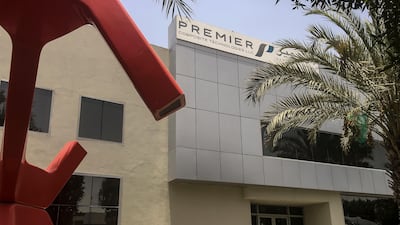As a company supplying materials for some of the most eye-catching construction projects, Dubai’s Premier Composite Technologies is winning global acclaim.
Its hundreds of staff, however, are facing hardship as wages continue to go unpaid just months after a previous financial crisis was seemingly resolved.
The company, based in Dubai Investments Park, won widespread praise for its role in the construction of Apple’s new flagship headquarters in California, helping supply materials for the building’s 80-tonne space-age roof.
It also supplied materials for the solar-powered wing-doors on Apple’s Dubai Mall store.
A logistics supervisor organising transportation at PCT has been forced to send his family home as he can no longer afford to support them in Abu Dhabi due to unpaid wages.
“I can’t leave the country unless I have a certain amount of cash, and I know a lot of other employees are in the same situation and suffering a lot,” said SD.
“I have a credit card to repay and have asked for a letter from the finance department to show there are problems, otherwise I’ll be in trouble with police.
“I’m getting calls from banks asking for money. I have asked the HR department to help but they don’t know when the cash flow issues will be resolved.”
SD said he has been paid up to April but is still owed over two months’ salary, about Dh35,000.
“We’ve not had an email to explain what the delay is, or when we will be paid. There are more than 1,400 people in the same position as me,” said SD, who lives in company accommodation.
__________________
Read more:
Rules in place for companies to face sanctions
The Dubai company behind Apple's new flying saucer roof is the strong and silent type
__________________
PCT has completed contracts on several high-profile projects in recent months, in contrast to much of the construction sector in the UAE and Saudi Arabia, which has shrunk by about US$17 billion last year, according to project management firm Faithful+Gould.
It worked on 250 giant umbrellas in Medina to shade pilgrims attending Hajj in summer and panels for the spectacular concourse at Saudi Arabia’s high-speed rail link, also in Medina.
Other projects have been completed in Angola, on a new assembly hall, and a dome housing a huge telescope in Turkmenistan.
With those projects now in the bag, the hundreds of employees owed wages are puzzled as to why their salaries are yet to be paid.
A logistics supervisor at PCT said he is owed more than Dh20,000 and has had to ask his family for a loan to help pay his rent as he struggles to make ends meet.
“The company has developed a good name for itself and comes across publicly as a stable firm but, internally, it is messed up,” he said.
“No one knows where the money is going to. There are not even materials to build boats but we are still taking on big projects.
“Because it has been going on for nearly two years now, morale is pretty low. We are still getting pushed to finish stuff, even though we are not getting paid.”
Another worker who is owed more than Dh40,000 said staff have been looking for other jobs but fear losing the chance to recover their outstanding salaries if they leave.
“I don’t know how long we can manage for, many of us are looking for new jobs but it is not easy,” he said.
“We’ve been working for free. I received mail from the bank demanding payment, otherwise they will open a case.
“There is a risk of a travel ban, then we can’t do anything. Everyone is owed money.”
PCT was hit by a similar cashflow crisis in January, with hundreds of workers owed wages.
Managing director Hannes Waimer emailed staff to reassure workers earning less than Dh5,000 a month that they would be offered Dh200 for food, and he blamed the cash crisis on unpaid contracts in Saudi Arabia.
In his staff email, Mr Waimer reassured staff that new contracts were in the offing that would resolve the company’s financial woes. However, five months on and the financial problems have resurfaced.
In an interview in January, Mr Waimer said: “In the last year Saudi Arabia has had problems paying its dues to contractors. I have some issues but the company is still profitable and has a good workload.
“We are taking this extremely seriously as employees are assets. We are doing all we can to support the staff by doing regular payments from a hardship fund to labourers.”
PCT did not respond to several requests for comment.


